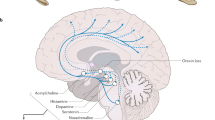Abstract
Narcolepsy is a debilitating sleep disorder characterized by daytime sleepiness and cataplexy. The strong association of narcolepsy with the HLA system suggests an autoimmune cause. Tumor necrosis factor is a cytokine involved in both regulation of immune mechanisms and sleep. Several studies were undertaken to determine a contribution of tumor necrosis factor and its receptors to the pathogenesis of narcolepsy. A significant increase in the 196R allele, a functionally relevant polymorphism in the TNFR2 gene, has been found in Japanese patients, indicating altered transduction of tumor necrosis factor signals. Here we explore polymorphisms in both tumor necrosis factor receptor genes as risk factors in a German population sample. Neither the polymorphism in the TNFR1 nor that in the TNFR2 gene was associated with narcolepsy. Our findings contrast to those previously published and thus provide evidence for genetic heterogeneity between different narcolepsy populations.
Similar content being viewed by others
Abbreviations
- SNP :
-
Single-nucleotide polymorphisms
- TNF :
-
Tumor necrosis factor
- TNFR :
-
TNF receptor
References
Aldrich MS (1992) Narcolepsy. Neurology 42:34–43
Lin L, Faraco J, Li R, et al (1999) The sleep disorder canine narcolepsy is caused by a mutation in the hypocretin (orexin) receptor 2 gene. Cell 98:365–376
Chemelli RM, Willie JT, Sinton CM, et al (1999) Narcolepsy in orexin knockout mice: molecular genetics of sleep regulation. Cell 98:437–451
Nishino S, Ripley B, Overeem S, Lammers GJ, Mignot E (2000) Hypocretin (orexin) deficiency in human narcolepsy. Lancet 355:39–40
Peyron C, Faraco J, Rogers W, et al (2000) A mutation in a case of early onset narcolepsy and a generalized absence of hypocretin peptides in human narcoleptic brains. Nat Med 6:991–997
Gencik M, Dahmen N, Wieczorek S, et al (2001) A prepro-orexin gene polymorphism is associated with narcolepsy. Neurology 56:115–117
Mignot E, Lin X, Arrigoni J, Macaubas C, et al (1994) DQB1*0602 and DQA1*0102 (DQ1) are better markers than DR2 for narcolepsy in Caucasian and black Americans. Sleep 17:60–67
Lin L, Hungs M, Mignot E (2001) Narcolepsy and the HLA region. J Neuroimmunol 117:9–20
Mullington JM, Hinze-Selch D, Pollmacher T (2001) Mediators of inflammation and their interaction with sleep: relevance for chronic fatigue syndrome and related conditions. Ann N Y Acad Sci 933:201–210
Vgontzas AN, Papanicolaou DA, Bixler EO, Kales A, Tyson K, Chrousos GP (1997) Elevation of plasma cytokines in disorders of excessive daytime sleepiness: role of sleep disturbance and obesity. J Clin Endocrinol Metab 82:1313–1316
Hohjoh H, Terada N, Kawashima M, Honda Y, Tokunaga K (2000) Significant association of the tumor necrosis factor receptor 2 (TNFR2) gene with human narcolepsy. Tissue Antigens 56:446–448
Kato T, Honda M, Kuwata S, et al (1999) A search for a mutation in the tumour necrosis factor-alpha gene in narcolepsy. Psychiatry Clin Neurosci 53:421–423
Hohjoh H, Nakayama T, Ohashi J, et al (1999) Significant association of a single nucleotide polymorphism in the tumor necrosis factor-alpha (TNF-alpha) gene promoter with human narcolepsy. Tissue Antigens 54:138–145
Morita C, Horiuchi T, Tsukamoto H, et al (2001) Association of tumor necrosis factor receptor type II polymorphism 196R with systemic lupus erythematosus in the Japanese: molecular and functional analysis. Arthritis Rheum 44:2819–2827
Komata T, Tsuchiya N, Matsushita M, Hagiwara K, Tokunaga K (1999) Association of tumor necrosis factor receptor 2 (TNFR2) polymorphism with susceptibility to systemic lupus erythematosus. Tissue Antigens 53:527–533
Al-Ansari AS, Ollier WE, Villarreal J, Ordi J, Teh LS, Hajeer AH (2000) Tumor necrosis factor receptor II (TNFRII) exon 6 polymorphism in systemic lupus erythematosus. Tissue Antigens 55:97–99
Acknowledgements
This work contains parts of the doctoral thesis of S.W. The study was supported by DFG grant DA 370/4-1 and Forum (821906).
Author information
Authors and Affiliations
Corresponding author
Rights and permissions
About this article
Cite this article
Wieczorek, S., Dahmen, N., Jagiello, P. et al. Polymorphisms of the tumor necrosis factor receptors: no association with narcolepsy in German patients. J Mol Med 81, 87–90 (2003). https://doi.org/10.1007/s00109-002-0405-8
Received:
Accepted:
Published:
Issue Date:
DOI: https://doi.org/10.1007/s00109-002-0405-8




